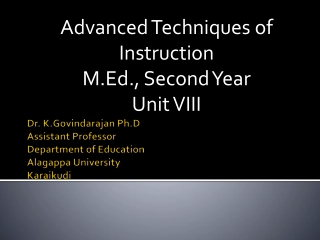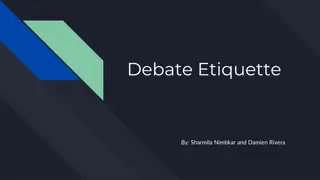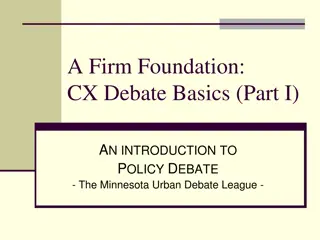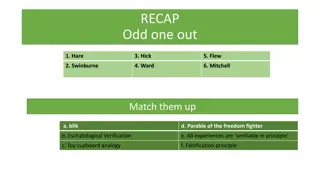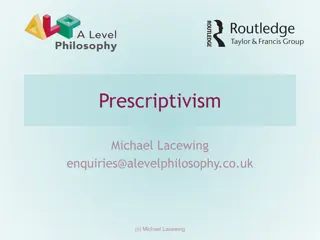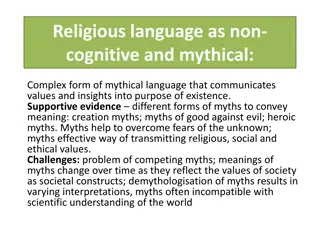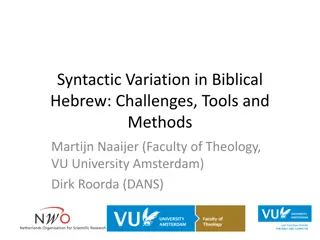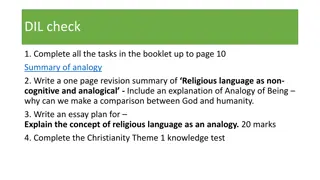Understanding Religious Language: Cognitivism vs. Non-Cognitivism in the University Debate
This discussion explores the debate between cognitivism and non-cognitivism in religious language. Cognitivism asserts that religious claims aim to describe the world and can be true or false, while non-cognitivism argues that such claims express attitudes and cannot be verified. Flew's challenge questions the meaningfulness of religious claims without clear criteria for falsification. Mitchell's response emphasizes the role of experiences in evaluating beliefs.
Download Presentation

Please find below an Image/Link to download the presentation.
The content on the website is provided AS IS for your information and personal use only. It may not be sold, licensed, or shared on other websites without obtaining consent from the author. Download presentation by click this link. If you encounter any issues during the download, it is possible that the publisher has removed the file from their server.
E N D
Presentation Transcript
Religious language: the University debate Michael Lacewing enquiries@alevelphilosophy.co.uk (c) Michael Lacewing
Cognitivism v non-cognitivism What are we doing when we are talking about God? Cognitivism: religious claims, e.g. God exists Aim to describe how the world is Can be true or false Express beliefs that the claim is true Non-cognitivism: religious claims Do not aim to describe the world Cannot be true or false Express attitudes towards the world (c) Michael Lacewing
Flews challenge The two explorers in the jungle How is an undetectable gardener different from no gardener at all? For a claim to be meaningful, there must be something it is denying There must be some way of establishing that it is false Under what circumstances are we prepared to withdraw the claim? What experiences would lead a religious believer to accept that God exists is false? If there are no such experiences, the claim has no meaning Flew is a cognitivist about religious language (c) Michael Lacewing
Flews argument For a truth claim to be meaningful, there must be some possible state of affairs it denies or rules out. Therefore, to meaningfully assert a claim, someone must accept that it rules out some possible state of affairs. The occurrence of a state of affairs that a claim rules out demonstrates that the claim is false. Therefore, to meaningfully assert a claim, someone must be willing to withdraw it if the state of affairs it rules out were to occur. (c) Michael Lacewing
Flews argument Religious believers refuse to specify which state of affairs would lead them to withdraw the claim that God exists . Therefore, when religious believers say God exists , they do not rule out any state of affairs. Therefore, the claim that God exists , when made by religious believers, is meaningless. (c) Michael Lacewing
Mitchells response Flew is right that we must allow experiences to count against a claim, if the claim is to be meaningful But this doesn t mean that we have to withdraw it The story of the trusting partisan When does counter-evidence become so strong that a belief becomes irrational? There is no abstract answer (c) Michael Lacewing
Mitchells response Religious beliefs aren t provisional hypotheses, but involve commitments We must count evidence against them, but aren t required to withdraw them Flew accepts this qualification, but appeals to the problem of evil to argue that belief in God should be withdrawn And if it is not withdrawn, it becomes irrational But this is no longer about the meaning of religious language, but the rationality of religious belief (c) Michael Lacewing
Hares bliks Religious beliefs are not like ordinary assertions, but part of someone s blik , an attitude or view of the world Differences in bliks can t be shown to be true or false by empirical experience Examples of bliks An incorrigible view that university lecturers want to murder you Trust in the properties of steel v. not Believing that everything happens by chance v laws of nature The difference between holding these bliks is meaningful and make a difference to our lives To hold that God exists (or not) is a blik (c) Michael Lacewing
Discussion Are bliks cognitive or non-cognitive? Cognitive: bliks can be true or false (independent of what you hold) Non-cognitive: bliks can t be falsified and work like attitudes But: any normal cognitive belief could be a blik It depends how the person thinks about it When someone holds a blik when we hold beliefs, we think they are irrational Does Hare s view entail that religious belief is irrational? Flew: Hare s view contradicts what religious believers actually think about their beliefs (c) Michael Lacewing


